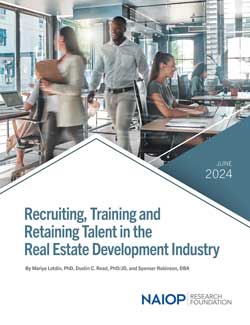Real estate academic programs and CRE firms can partner to better prepare students for real-world conditions.
The real estate industry depends on a steady pipeline of well-prepared professionals. Across the United States, real estate academic programs are evolving to meet that need, building curricula that reflect the complex and changing demands of real estate practice. These programs don’t all look the same, but conversations with their academic leaders suggest common priorities
are emerging.
For firms looking to recruit talent, shape educational content or stay close to the future of the profession, real estate academic programs offer both opportunity and insight. They are not just sources of entry-level hires; they are important partners in preparing the next generation of professionals.
Multiple Academic Homes, Shared Industry Goals
One of the distinctive features of real estate education in the U.S. is its interdisciplinary structure. Programs can be found in business schools, where the focus often leans heavily toward finance, investment and market dynamics. Others are housed in architecture or planning departments, where students engage more deeply with land use, design and the broader built environment.
Each academic home possesses strengths. Business-based programs tend to produce students who are well versed in financial modeling and investment analysis. Architecture and planning program graduates often perform well in spatial reasoning, sustainability and place-making. Despite these different orientations, interviews with program directors reveal significant agreement on what real estate graduates need to succeed: a combination of technical skill, interpersonal effectiveness and exposure to real-world projects.
For practitioners, understanding a program’s orientation can help clarify the kind of graduates it produces while also supporting more targeted recruiting and mentoring strategies.
Convergence Around Core Competencies
Regardless of discipline, real estate academic programs have increasingly aligned their curricula with employer expectations. Interviewees from a dozen programs consistently emphasized three shared areas of focus: technical skills, communication/leadership and industry engagement.
Programs are prioritizing technical competencies such as financial modeling, market analysis and investment underwriting. These skills are often taught using leading industry platforms such as CoStar, Green Street and ARGUS. One program director noted that its curriculum ensures students are “proficient in financial modeling and market analysis,” a statement echoed by others across disciplines.
At the same time, faculty recognized that technical expertise alone is not enough. Communication, negotiation and teamwork were cited as being essential to working across stakeholder groups and managing complex projects. Several programs include role-playing, client presentations and group projects specifically designed to develop these capabilities.
This blend of technical and soft skills reflects the demands of real estate practice and suggests why professionals might find value in engaging with academic partners. Many academic program leaders suggested that the more interaction they could facilitate between professors, students and practitioners, the better the alignment would be between what is taught and what is needed on the job.
Learning by Doing
Experiential learning is now a central feature of most real estate programs. Internships, case competitions, capstone projects and collaborative studios give students the chance to apply classroom knowledge in professional settings. Educators repeatedly cited these experiences as offering some of the most impactful aspects of a real estate education.
Internships are widely seen as essential. They provide students with practical exposure to the industry and allow employers to evaluate potential hires before graduation. Project-based learning also plays a key role, with many programs offering real-world development projects, financial modeling exercises or strategic plans that students complete in consultation with industry partners.
For firms, engaging with students through internships or project sponsorship isn’t just a contribution to education — it’s a way to identify capable candidates and assess how they perform under real-world conditions. Internships are an investment in potential future employees.
Keeping Curricula Relevant
As real estate evolves, driven by shifts in technology; environmental, social and governance metrics; and tenant demands, academic programs are adjusting their content to keep pace. Faculty rely on advisory boards, alumni conversations and employer feedback to stay current.
Topics like sustainability, data analytics, proptech and risk management are increasingly part of the curriculum. Some programs are incorporating tools such as building information modeling, geographic information systems and even virtual reality into their coursework. These integrations reflect the industry’s changing expectations around project evaluation, visualization and investment strategy.
Practitioners have a key role to play in this process. Guest lectures, curriculum feedback and partnership on applied projects help ensure students are learning in ways that reflect actual market conditions. This involvement also creates touchpoints between students and future employers, building familiarity and trust.
What Great Programs Deliver
Interviews revealed that the strongest programs — regardless of their academic setting — focus on producing well-rounded professionals who are technically capable, intellectually curious and prepared to work in collaborative, interdisciplinary settings. These graduates are equipped to model investments, analyze markets and present to clients. Just as importantly, they are ready to listen, lead and adapt.
This convergence on best practices doesn’t eliminate the diversity of program structures, but it does create more consistency in graduate preparedness. That consistency benefits firms looking to hire or train real estate students or otherwise partner with academic institutions.
Why Industry Engagement Matters
Industry leaders who stay involved with real estate academic programs help shape the future of the profession. Whether through mentoring, guest speaking, hosting interns or serving on advisory boards, professional involvement supports students while also giving firms early access to rising talent.
Several faculty members emphasized that regular input from the industry helps them update content quickly and accurately. In turn, this responsiveness helps firms hire graduates who are already familiar with key tools, concepts and expectations.
Even informal conversations between employers and faculty can lead to meaningful curriculum improvements. The closer the dialogue, the stronger the alignment between what students learn and what firms need.
Partners in Developing the Industry’s Future
Real estate academic programs are not static — they are active ecosystems that reflect, respond to and help shape the real estate industry. They offer more than just a source of junior talent. They are partners in building the workforce on which the industry depends.
For professionals, staying engaged with these programs is a practical investment. It supports better hiring outcomes, stronger professional development, and a more prepared and adaptable workforce. Whether through internships, guest speaking or advisory roles, the return on that engagement can be substantial — for students and employers alike.
Spenser Robinson, D.B.A., is the Campbell Endowed Professor, chair of the Entrepreneurship Department, and director of real estate in the Finance and Law Department at Central Michigan University. Dustin Read, Ph.D., J.D., heads the Blackwood Department of Real Estate in the Pamplin College of Business at Virginia Tech. Mariya Letdin, Ph.D., is an associate professor of real estate at Florida State University’s College of Business.
This article is based on interviews conducted for the NAIOP Research Foundation report “Recruiting, Training and Retaining Talent in the Real Estate Development Industry.” It also borrows from the authors’ scholarly work, “Similarities, Differences and Best Practices Across Real Estate Education Programs in the United States,” published in the Journal of Real Estate Practice and Education (Volume 27, Issue 1, 2025).
Relevant Reading Real estate firms of all kinds rely on their employees to grow and thrive. The importance of talent is even more pronounced in the commercial real estate development industry, where employees’ abilities and personal judgment make the difference between successful projects, those that fail to meet investor expectations and those that never make it off the drawing board. A commercial real estate firm’s ability to recruit, train and retain talent is therefore a critical source of competitive advantage. The NAIOP Research Foundation commissioned the June 2024 report “Recruiting, Training and Retaining Talent in the Real Estate Development Industry” to examine best practices for commercial real estate development firms. The study by Mariya Letdin, Dustin Read and Spenser Robinson draws on interviews and focus groups with developers, interviews with executive recruiters, and a survey of NAIOP members. |






